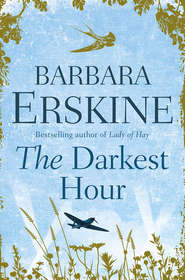По всем вопросам обращайтесь на: info@litportal.ru
(©) 2003-2024.
✖
Encounters
Автор
Год написания книги
2018
Настройки чтения
Размер шрифта
Высота строк
Поля
Next morning when she woke he had gone from the bed. She stretched happily and lay gazing at the faint light behind the curtains, listening to the plaintive whistling of a blackbird.
Duncan had gone out to the sheep; later he would come back with the papers and some coffee and perhaps climb into bed, his hair damp from the shower as he laid his head on her breast. Lying in his arms then, clinging to him, her heart full of love, she knew something was still very wrong. But she no longer cared what it was. It was enough that he was there and that she was with him.
Then he went away. ‘Only for a couple of weeks, Annette. On business to Switzerland. I wish you could come too, my love.’
She’d known instantly, by the way he lowered his eyes and mumbled, unable to look at her, that he had lied. But which was the lie? That he was going on business, or that he wanted her to come too?
She swallowed her misery and worked extra hours at the office, trying not to think of what he might be doing in Switzerland, of what business a sheep farmer could possibly have in Geneva or the high mountains beyond.
When he returned she knew she had lost him again. Oh, he was pleased to see her; and his warmth when he drew her to him was real, but something had changed. His reserve had returned and she knew that, if she asked, he would say again, ‘We must not get involved, Annette,’ and that for him it would be true.
She cried a lot that summer, unhappy in her love, seeking comfort in the arms which were the source of her unhappiness, but unable to tear herself away.
It was his mother who told her. His parents lived not far away, watching their son’s farming efforts with tolerant amusement – but they were less amused by Annette.
She was a little in awe of his mother. Janet was so capable and hearty, so unruffled by anything. So it was a shock one morning to come down into the kitchen wearing Duncan’s bathrobe to find Janet standing there, her coat still on, staring out of the window at the garden. The woman turned and looked at Annette, her face full of compassion. The expression hit Annette like a hammer. Her veins iced over as she guessed instinctively something of what was to come.
‘Annette dear, Duncan tells me that you and he are not involved. That yours is an open relationship, whatever that means.’ Janet’s face had become unusually pink and shiny. ‘I don’t believe him altogether. I think you are more involved than he realizes and I don’t want you to get hurt.’
It was suddenly so cold in the room.
‘I won’t get hurt,’ Annette said cheerfully. ‘Duncan’s quite right. It is an open relationship.’
‘And so you know about Celia?’
There was a lump of something in her throat, pressing down on her windpipe, stopping her breathing properly.
‘Celia?’ She had to pretend. She had to say she didn’t care.
‘His fiancée, Annette.’ Janet’s voice was unusually gentle. ‘She will be coming back you know.’
‘Where is she?’ Her voice sounded strange in her own ears, thin and high, like a bird screaming in a storm.
‘She’s still in Switzerland, at the clinic. But she will be completely cured. And Duncan swore he’d wait for her, my dear. He swore.’
‘Of course he did.’ She sounded light and carefree now as she pulled the belt of the robe more tightly round her slim waist. ‘You don’t have to worry, Janet. Really.’
Oh God, why hadn’t he told her? How could he have let her go on imagining that it would all have been all right in the end.
The words echoed round her brain as she dressed and pulled on her light jacket. Duncan was out with a sick ewe. His mother had left the house, spinning the wheels of the car in her agitation. The house was silent and deserted; the house she had secretly, in her heart, thought of already as home.
She walked across the bare garden, hands in pockets and looked out across the fields. There were no sheep there now; they were desolate, like her.
Then he was there beside her, his face glowing, his eyes laughing, his warmth and humour reaching out to her. ‘What about breakfast? I’m starving.’
‘How’s the ewe?’ The steady cheerfulness of her voice amazed her.
‘She’ll be OK. Crisis is over. Was that ma’s car I saw?’
Annette nodded. ‘She couldn’t wait. Just looked in to say hello.’
And goodbye. Because, of course, Annette could never come to the farm again. She didn’t say anything in the end. What was the point of screaming and ranting at him? He had made no promises, held out no hope of the future. He had assumed they were still working from the first blueprint. ‘No involvement, Annette my love. Just a good time while we’re both at a loose end, OK?’
In the house, as she made the coffee with absolute concentration, Duncan said, ‘Paula and Tony have asked us to dinner next weekend to see how their extension is progressing.’ He did not look up. His face was buried in the newspaper.
‘Oh what a shame. I’d love to have gone.’ She was pouring the coffee, not looking at him, but she heard the rustle of the paper as he put it down.
‘Why can’t you?’ Amazed. Even slightly hurt.
‘I can’t come down next weekend, Duncan, I’m sorry. In fact not for several weeks. I’m tied up.’ She put the cup on the table without raising her eyes to his. ‘It’s nearly Christmas after all. I’ve so much to do. I’m ashamed I’ve allowed myself to come down here so much!’ That was it. Bright and brittle. Don’t ever show how much you are hurting inside.
She could feel him looking at her; imagine the thoughtful puzzlement with which he was watching. And she knew she would not be fooling him for an instant. She looked up at last and met his gaze, smiling. ‘You’ll have to do without me, Duncan. I think it’s best.’ She could not fight a sick enemy, one she had never seen. Another flesh and blood woman, yes, with nails bared and teeth set, but not this pale consumptive image, with her overtones of tragedy.
Duncan stood up and came round the table. ‘Annette …’
‘No, please. Don’t say anything. Make my apologies to Paula. Perhaps I’ll come back after …’
After what? Christmas? His marriage? His birthday? After it stopped hurting?
In the afternoon she packed slowly not waiting to read the Sunday papers with him by the fire, taking from the kitchen a couple of carrier bags to put all the extras in. The things which she had grown used to leaving behind week after week. Her records, her boots, a couple of books, the heavy Aran sweater she never wore in town. She piled them by the front door and took the old duffle coat off the hook. That, too, must go back. When she looked round he was standing in the doorway watching her.
‘My mother did this.’
‘No, Duncan. I always knew it wouldn’t last. I just didn’t know how long I’d got.’
He put his hands on her shoulders and drew her to him. ‘Supposing I told you I’d change. I’ve grown so fond of you, Annette. I don’t know that I can live without you. Not now.’
She felt her throat constrict. ‘You must,’ she whispered.
He took her to the train at last and found her a corner seat with her bags, then he jumped off as the train was already moving – no time for any goodbyes. But there was no one sitting opposite her to shame her into holding back her tears and she felt them run scalding down her cheeks as she turned her face to the window and saw the countryside gathering speed until it blurred and faded behind the dirty glass.
On Friday, in case he came, she rang the office and told them she had a migraine. The following week she went in as usual, thinking she felt more able to cope, but she did not have to. He did not appear.
She did not know whether he came up to see Kevin Spiggs again. She suspected he had never really needed to anyway, after that first time. He had come only to see her.
It was three months before she heard from him again. He phoned her at the office. ‘How are you, Annette?’
Her heart, cured, distracted, no longer his, turned upside down at the sound of his voice.
‘I’m fine. How are you?’
She thought she managed to sound casual. She fixed her mind determinedly on Robert, the new man in her life, who would be taking her out later that evening; Robert who had three times asked her to marry him.
‘Can I take you out to lunch tomorrow?’ Duncan sounded uncomfortable and quite suddenly she forgot her own unhappiness in a wave of sympathy for him.
‘That would be nice. But it will have to be fairly brief I’m afraid. We’re very busy at the office at the moment.’
‘Fine. I’ll pick you up around 12.30.’











